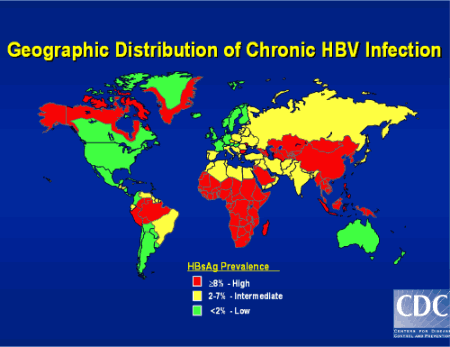 |  |  |
|---|
Hepatitis B is a viral infection of the liver and approximately 1/3 of a billion people world wide have a chronic infection.
Chronic Hepatitis B infections can lead to liver cirrhosis, cancer and death.
Hepatitis B infection is spread to humans by mixing bodily fluids or blood by accidents, blood transfusions, sexual intercourse, tattooing, acupuncture and reusing needles or medical equipment.
Hepatitis B infections are more common in certain parts of the world with up to 10% of people in SE Asia being affected.
Hepatitis B viral disease is incurable and can lead to acute infection and death or liver cirrhosis, liver cancer and death over time.
Other symptoms include jaundice ( yellow eyes), weight loss, loss of appetite, tiredness, fever, dark urine and light coloured stools.
The best way to reduce the risk of infection is by being vaccinated as it is not always possible to prevent accidents and accident rates are higher abroad especially in young travellers and undertaking adventure pursuits.
Hepatitis B Vaccination (Non-live)
Primary Hepatitis B vaccination is a course of three vaccinations given via the accelerated method over a minimum of 21 days with a booster dose given 1 year later.
It is a very safe vaccination and can be given from birth although the childhood scheduled needs to be given over 6 months for those under 18 years old.
For those who require vaccination for occupational purposes a blood immunity check at least four weeks after the primary course is completed is strongly recommended to ensure they are safe to work. We offer a discounted rate for Occupational Health works taking up the vaccination and immunity check together
The travel immunisation clinics offered by FlyingMedicine™ is experienced in ensure gently vaccination and immunisation checks to ensure adequate immunity levels
